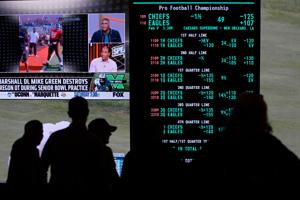
News
October 25, 2025
What Americans think about legal sports betting, according to recent polls
As legalized sports betting expands, recent polling suggests that Americans have become increasingly critical of its role in U.S. society and sports.
**Americans Increasingly Wary of Legal Sports Betting, Polls Suggest**
The rapid expansion of legalized sports betting across the United States has been met with a growing wave of scrutiny from the American public, according to recent polls. While the industry touts potential economic benefits and increased fan engagement, these surveys indicate that a significant portion of Americans are becoming more critical of its impact on society and the integrity of sports.
Several factors appear to be driving this shift in public opinion. Concerns about problem gambling, the potential for match-fixing, and the saturation of sports programming with betting advertisements are all contributing to a more cautious perspective. The polls suggest that many Americans are worried about the accessibility of online betting platforms and their potential to exacerbate gambling addiction, particularly among young people.
Furthermore, the constant barrage of betting commercials during sporting events is grating on some viewers. The polls highlight a growing sentiment that these advertisements are overly pervasive and contribute to a culture where gambling is normalized and even encouraged. This concern extends to the sponsorship deals between betting companies and sports teams, which some perceive as blurring the lines between entertainment and gambling.
The polls also reveal a notable divide in opinion based on demographics. While some groups, particularly younger men, may be more accepting of sports betting, others, including older adults and women, tend to express greater reservations. This suggests that the industry faces a challenge in appealing to a broader audience and addressing the specific concerns of different segments of the population.
The findings from these polls present a complex picture of the public's perception of legalized sports betting. While the industry has undoubtedly gained a foothold in the American landscape, the growing skepticism suggests that it needs to address the ethical and social concerns raised by the public to ensure its long-term sustainability and acceptance. Lawmakers and regulators will likely be paying close attention to these trends as they consider future legislation and oversight of the burgeoning sports betting market.
The rapid expansion of legalized sports betting across the United States has been met with a growing wave of scrutiny from the American public, according to recent polls. While the industry touts potential economic benefits and increased fan engagement, these surveys indicate that a significant portion of Americans are becoming more critical of its impact on society and the integrity of sports.
Several factors appear to be driving this shift in public opinion. Concerns about problem gambling, the potential for match-fixing, and the saturation of sports programming with betting advertisements are all contributing to a more cautious perspective. The polls suggest that many Americans are worried about the accessibility of online betting platforms and their potential to exacerbate gambling addiction, particularly among young people.
Furthermore, the constant barrage of betting commercials during sporting events is grating on some viewers. The polls highlight a growing sentiment that these advertisements are overly pervasive and contribute to a culture where gambling is normalized and even encouraged. This concern extends to the sponsorship deals between betting companies and sports teams, which some perceive as blurring the lines between entertainment and gambling.
The polls also reveal a notable divide in opinion based on demographics. While some groups, particularly younger men, may be more accepting of sports betting, others, including older adults and women, tend to express greater reservations. This suggests that the industry faces a challenge in appealing to a broader audience and addressing the specific concerns of different segments of the population.
The findings from these polls present a complex picture of the public's perception of legalized sports betting. While the industry has undoubtedly gained a foothold in the American landscape, the growing skepticism suggests that it needs to address the ethical and social concerns raised by the public to ensure its long-term sustainability and acceptance. Lawmakers and regulators will likely be paying close attention to these trends as they consider future legislation and oversight of the burgeoning sports betting market.
Category:
Politics